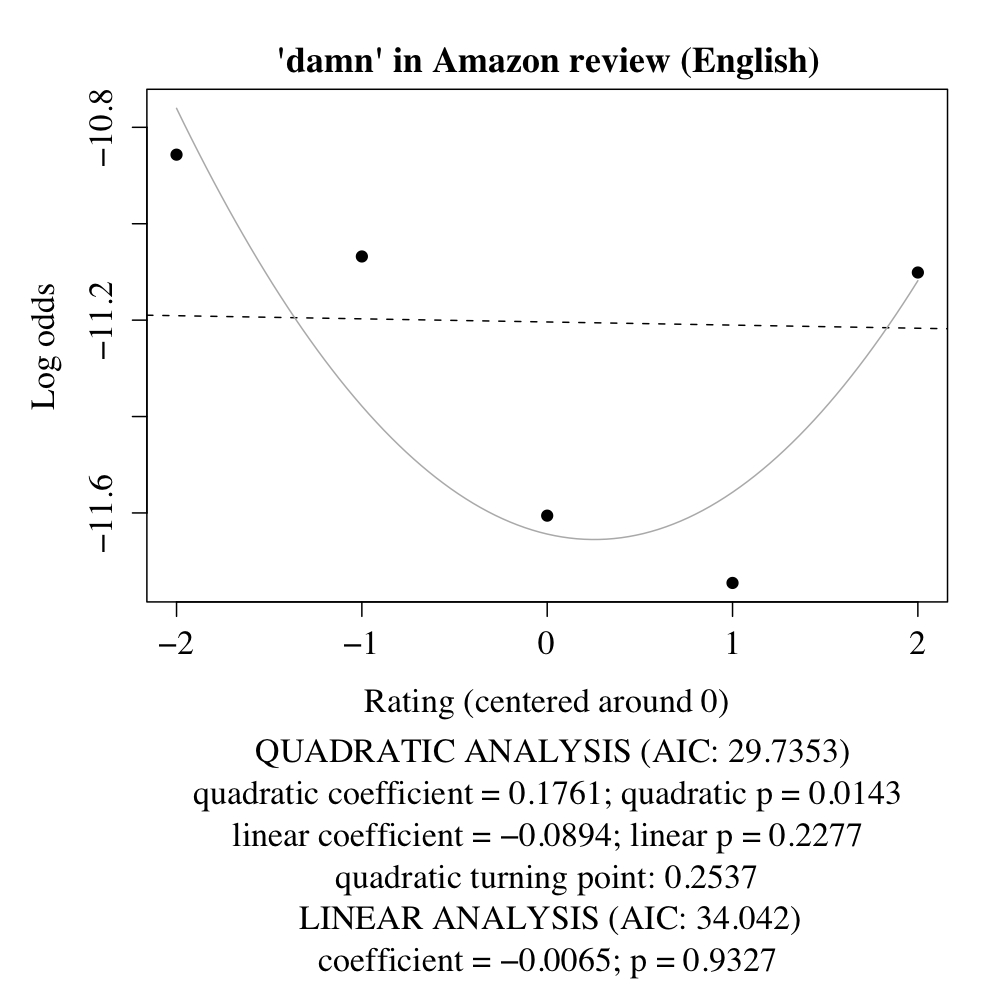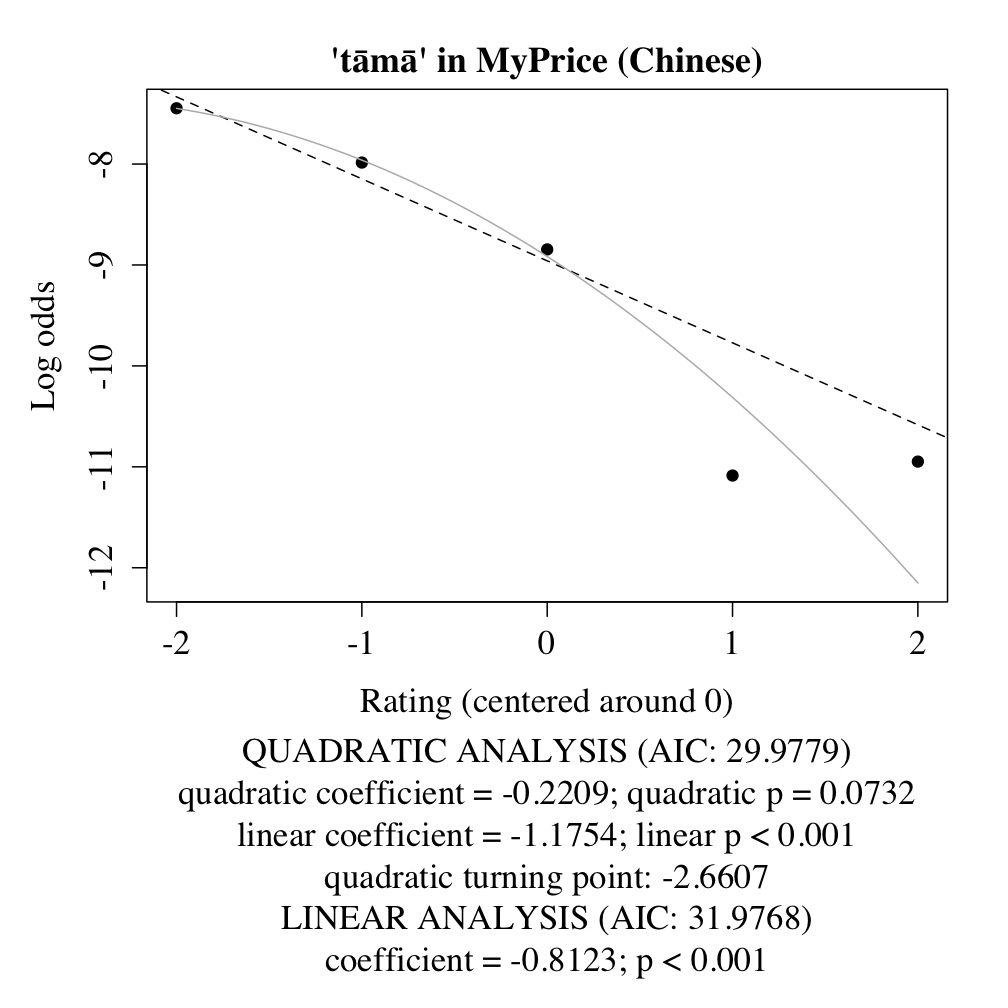What does the F-word contribute?
« previous post | next post »
In this earlier post, I was critical of the FCC's claim that the F-word "inherently has a sexual connotation" no matter what the context. (The Supreme Court took up this question yesterday.) However, my post doesn't offer any suggestions for how to get a clear look at what the F-word does contribute to a discourse. Though I don't have results for the F-word in particular, I do have results for more mildly-taboo items, including English damn and the Chinese intensive tama(de). (I'm hoping that this follow-up post allays any fears Geoff Pullum might have that I now see language as a big bag of words…)
To get a clear look at what expressives like the F-word contribute, we need to know about the circumstances under which they were produced. Here in UMass Amherst Linguistics, we've been studying expressives in corpora of online product reviews in which each text is associated with a rating, one-star through five-stars. The ratings approximate linguistically important aspects of the author's emotional/attitudinal state while writing. These collections don't contain the F-word, but they contain plenty of other expressives.
For damn, the overall picture is this: it is significantly more frequent in the extreme reviews — the angry one-star reviews and the exuberant five-star reviews — than it is in the more ambivalent two-to-five star reviews. Here is a picture, using the same statistical methods employed in this post about affective demonstratives:
The gray line is a quadratic regression. The numbers point to the conclusion that this is a good model, thereby validating the U-shaped impression of the empirical log-odds distribution (the black dots). (We've shifted the five-star ratings over by three to get a better picture of where the turning point of the curve is.) The linear fit (dashed line) is poor. Results like this suggest that damn is a marker of heightened emotion, though one that doesn't say much about whether that emotion is positive or negative. Other English items that have distributions like this are absolutely, wow, and sequences of exclamation points.
Some expressives do, of course, bias for one emotional polarity or another. The Chinese national swear tāmā(de) is a nice example of a mild expressive with a negative bias:
Here, the linear fit is good; the frequency drops off steadily as the reviews get more positive. (My thanks to my coauthor Noah Constant for collecting the corpus from MyPrice.com.cn and analyzing the expressives in it.)
I am not sure whether the F-word would look more like damn or more like tāmā. One the one hand, the F-word clearly has positive uses, and it can be used exclamatively, as Bono and Chase Utley showed us. On the other hand, it might be caustic enough to show a significant bias for negativity, perhaps dropping off in frequency sooner than tāmā.
(A word of thanks to my co-authors Noah Constant, Christopher Davis, and Florian Schwarz.)


Mark P said,
November 6, 2008 @ 12:47 am
I always associated the term "fucking a" as a strong positive expression, or at least as indicating strong agreement. Apparently I was either mistaken or the usage has come to include strong negative sentiments. If that term were included, it seems intuitively that it would be like "damn".
John Cowan said,
November 6, 2008 @ 1:35 am
In Spider Robinson's novel Night of Power the expletive Fucking A gets progressively more worn-out as the night goes on, and has to be replaced by Fucking B and eventually Fucking C as ever-increasing wows hit the characters — and the reader.
A-gu said,
November 6, 2008 @ 1:38 am
Ta-ma-de — also (Ta)ma-de — is actually already a sort of polite shortened form. The full phrase is Ta ma de bi.
kellen said,
November 6, 2008 @ 2:26 am
which in turn is a shortened form of qu ta ma de bi, 去他妈的屄
incidently i just wrote about bi (vulgar form of vagina) and diao (vulgar form of penis) used in chinese to express positive feelings about things not three days ago. my name links to it here.
Joe said,
November 6, 2008 @ 3:36 am
I saw someone else make the point online that if we can't use the f-word because it's inherently sexual, why can they talk about sex with non-taboo vocabulary?
Martyn Cornell said,
November 6, 2008 @ 1:35 pm
Joe – because fucking is transgressional sex – you fuck whores, you make love with your wife.
language hat said,
November 6, 2008 @ 2:15 pm
I don't think that's true, at least in the usage of a lot of English speakers.
ilikejam said,
November 6, 2008 @ 3:08 pm
You should hear the language in conversational use in most of Scotland. The use of 'f-ck' is widely accepted, even in the workplace.
'It's broken' == 'It's f-cked'
"Very good" == "F-ckin' brilliant"
"Oh my!" == "F—ck me!"
"He's left" == "He's f-cked off"
It's so ingrained that no-one notices. It's even used in place of the classic 'errr' or 'uhhh' when pausing to find the right word/phrase to use next.
There's a joke/observation about a Scottish guy at a football match, when the referee makes a dubious decision – the guy jumps out of his seat and shouts: "F-ckin'….. Booo!".